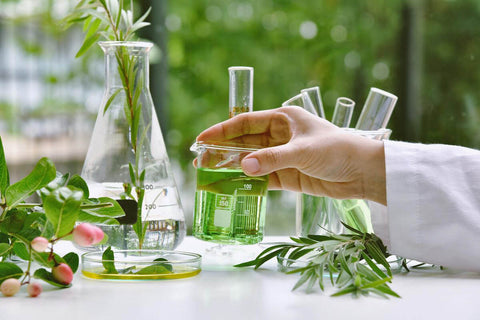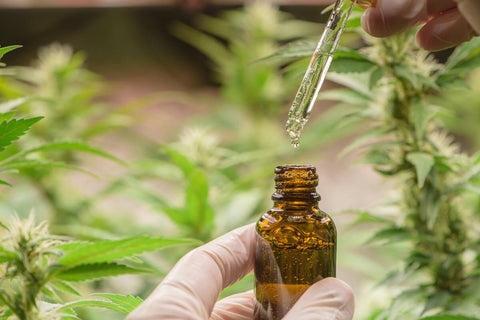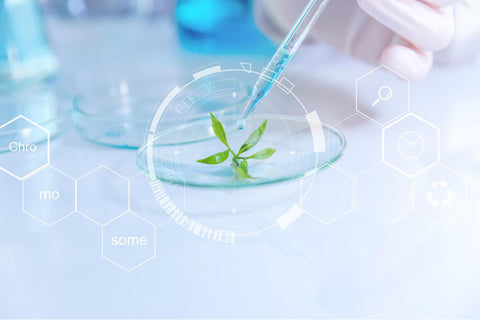Herbal extracts have been used for thousands of years for their therapeutic and medicinal properties. They contain active compounds in plants, making them highly concentrated and potent. Today, various types of herbal extracts are available, each with its unique extraction method, benefits, and uses. From water-based to alcohol-based extracts and powdered to fatty extracts, choosing the right herbal extract can make all the difference in achieving your desired outcome.

In this blog, we will explore the different types of herbal extracts, how they are extracted, their benefits, and their applications in various industries. Whether you're a herbal enthusiast or simply curious about the world of herbal extracts, this blog will provide a comprehensive overview of the types of herbal extracts available today.
What Are Herbal Extracts?
Herbal extracts are concentrated natural plant compounds obtained through various extraction methods, such as steam distillation, solvent extraction, or cold pressing.
These extracts contain active plant constituents, which may have therapeutic properties and can be used in various applications, including medicine, cosmetics, and food. Herbal Extracts are popularly used for their potential health benefits and are available in various forms, such as tinctures, capsules, powders, and oils.
Benefits of Using Herbal Extract
Herbal extracts have been used for centuries in traditional medicine and offer various potential health benefits due to their natural plant compounds. They contain active constituents that may help support overall health and wellness, improve digestion and gut health, and have anti-inflammatory and antioxidant effects.

Some herbal extracts also help improve cognitive function, support the immune system, and promote healthy skin and hair. Moreover, herbal extracts may provide a natural alternative to conventional medicine with potentially fewer side effects. However, it's important to note that more research is needed to confirm the effectiveness and safety of herbal extracts.
Also, the quality and potency of herbal extracts may vary depending on the extraction method and source. It's crucial to consult a healthcare professional before using herbal extracts, especially if you have a medical condition, take medications, or are pregnant.
Why Use Herbal Extract Rather Than Raw Herbs & Plants?
Herbal extracts are highly concentrated natural plant compounds with higher active constituent levels than raw herbs and plants. This makes them more potent and effective. Herbal extracts have a longer shelf life than raw herbs and plants, which can spoil quickly and lose potency.
Herbal extracts are more readily absorbed by the body than raw herbs and plants due to the extraction process that breaks down the plant material and makes the active compounds more accessible. Herbal extracts are available in various forms, including capsules, tinctures, powders, and oils, making them easy to use and incorporate into daily routines.
Uses of Herbal Extract In Different Industries
Herbal extracts are used in many industries to create the most effective solutions to many daily issues. Here are some different industries that use herbal extract.
1. Herbal Extracts In Cosmetics
Herbal extracts have been used in the cosmetics industry for their potential benefits for the skin and hair. The natural plant compounds in herbal extracts may have antioxidant, anti-inflammatory, and antimicrobial properties, making them popular ingredients in skincare and hair care products.

Herbal extracts are used in various forms in the cosmetics industry, such as oils, tinctures, and powders, and can be added to various products, including creams, lotions, serums, and shampoos.
2. Herbal Extracts In Food Industry
Herbal extracts in food offer various potential health benefits, such as reducing inflammation, improving digestion, and providing antioxidants.

However, more research is needed to confirm their effectiveness and safety in food products. Herbal extracts are also commonly used in the food industry as natural flavorings, colorings, and preservatives.
3. Herbal Extracts For Medicine
Herbal extracts in medicine may offer potential benefits, such as reducing inflammation, improving blood circulation, and supporting various bodily functions. However, it's important to note that more research is needed to confirm their effectiveness and safety for medicinal use.

The natural plant compounds in herbal extracts may have therapeutic properties that can help treat various health conditions.
How Do We Extract Herbs?
There are various methods for extracting herbs, each suited for different types of herbs and desired outcomes. Here are some common methods:
1. Water-Based Extraction: Also known as decoction or infusion, this method involves boiling or steeping herbs in water to extract their water-soluble compounds.
2. Alcohol-Based Extraction: This method involves steeping herbs in a high-proof alcohol solution to extract their alcohol-soluble compounds. Tinctures are a common form of alcohol-based herbal extracts.
3. Oil-Based Extraction: This method involves steeping herbs in a carrier oil, such as olive or coconut oil, to extract their oil-soluble compounds. Infused oils are a common form of oil-based herbal extracts.
4. Steam Distillation: This method uses steam to extract essential oils from herbs, highly concentrated forms of the plant's volatile compounds.
5. Solvent Extraction: This method involves using a chemical solvent, such as hexane or ethanol, to extract specific compounds from herbs. This method is typically used for industrial purposes, such as producing plant extracts for the food and cosmetics industries.
Types of Herbal Extracts
Herbal extracts are of different types; here are some herbal extracts in the market.
1. Fatty Or Liposomal Extracts: Fatty or liposomal extracts are herbal extracts that use a lipid-based carrier, such as coconut oil or lecithin, to extract and deliver the plant's active compounds. This method allows for better absorption and bioavailability of the herbal extract, making it more effective and potent.
2. Powdered Herbal Extracts: Powdered herbal extracts are a type of herbal extract that is made by drying and pulverizing the plant material into a fine powder. This method allows for easy and convenient use, as the powdered extract can be added to various food, drinks, and supplements. The powdered form also has a longer shelf life than other herbal extracts.
3. Essential Oils: Essential oils are highly concentrated, volatile compounds extracted from plants using steam distillation or cold-pressing methods. They contain the essence of the plant's fragrance and can be used for various purposes, such as aromatherapy, skincare, and cleaning. Essential oils are often used in very small quantities due to their potency.
4. Based On The Extraction Process: The extraction process involves using a specific method to isolate and extract the desired compounds from plant material. The method used varies depending on the type of plant, the desired outcome, and the intended use of the extract.
Common methods include water-based extraction, alcohol-based extraction, oil-based extraction, steam distillation, and solvent extraction. The extracted compounds are then processed and purified to produce a concentrated form of the desired extract.
Conclusion
Herbal extracts are concentrated and potent plant extracts with unique benefits and uses. VedaOils offers a variety of safe and effective herbal extracts, including powders and tinctures. Visit us at VedaOils.com to get the best herbal extracts at market-leading prices.













 Sign in
Sign in Register now
Register now My Reward Points
My Reward Points









